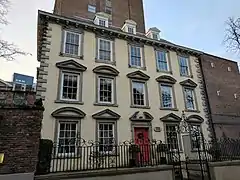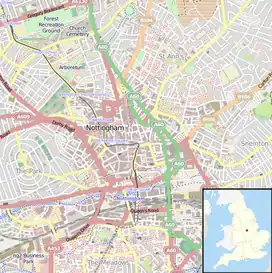Newdigate House
Newdigate House is a Grade II* listed[1] building on Castle Gate, Nottingham.
| Newdigate House | |
|---|---|
 | |
 Location in Nottingham | |
| General information | |
| Town or city | Nottingham |
| Country | England |
| Coordinates | 52°57′3.69″N 1°09′8.15″W |
| Completed | ca. 1675 |
The house was built for Thomas Charlton the younger, of Chilwell.[2] He sold it in 1683 to Samuel Staples of Nottingham who leased it to Camille d'Hostun, duc de Tallard who was effectively kept prisoner in it from 1705 to 1711 after defeat in the Battle of Blenheim in 1704.[3]
In 1716 the house was sold to Thomas Newdigate, the 6th son of Sir Richard Newdigate, 1st Baronet of Arbury Hall, Warwickshire. He commissioned Francis Foulgham to make the wrought-iron screen and gates which survive at the front of the house, enclosing the court yard.[4] It was lived in by subsequent members of the Newdigate family until 1790 when it was sold to Mrs Thomas Wright. She arranged for William Stretton to make some changes. The house was sold again in 1817.
In 1905 the building was being used by W. Lee, Antiques Dealer, and was put up for sale.[5]
In 1915 the house was used by the Domestic Workers’ Sub-Committee of the War Relief Fund as an office.[6]
In 1960 the house became the United Services Club, and is now part of World Service restaurant.
References
| Wikimedia Commons has media related to Newdigate House. |
- Historic England, "Newdigate House and attached railings and boundary wall (1271185)", National Heritage List for England, retrieved 31 December 2017
- Peter Smith (2005). Historic Buildings Report. Sherwin House and the Townhouses of Nottingham in the 17th and 18th centuries (Report). English Heritage. p. 12.
- "Prisoner General's Stay in Nottingham". Nottingham Evening Post. England. 28 April 1934. Retrieved 27 January 2018 – via British Newspaper Archive.
- Harwood, Elain (2008). Pevsner Architectural Guides. Yale University Press. pp. 66–67. ISBN 9780300126662.
- "Auction Sales". Nottingham Journal. England. 14 October 1905. Retrieved 27 January 2018 – via British Newspaper Archive.
- "War Relief Fund: Domestic Workers". Nottingham Journal. England. 27 March 1915. Retrieved 27 January 2018 – via British Newspaper Archive.
